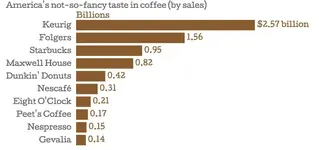rainboy75
New member
In 1714, the Mayor of Amsterdam presented a gift of a young coffee plant to King Louis XIV of France. The King ordered it to be planted in the Royal Botanical Garden in Paris. In 1723, a young naval officer, Gabriel de Clieu obtained a seedling from the King's plant. Despite a challenging voyage — complete with horrendous weather, a saboteur who tried to destroy the seedling, and a pirate attack — he managed to transport it safely to Martinique.
Once planted, the seedling not only thrived, but it’s credited with the spread of over 18 million coffee trees on the island of Martinique in the next 50 years. Even more incredible is that this seedling was the parent of all coffee trees throughout the Caribbean, South and Central America.
The famed Brazilian coffee owes its existence to Francisco de Mello Palheta, who was sent by the emperor to French Guiana to get coffee seedlings. The French were not willing to share, but the French Governor's wife, captivated by his good looks, gave him a large bouquet of flowers before he left— buried inside were enough coffee seeds to begin what is today a billion-dollar industry.
Missionaries and travelers, traders and colonists continued to carry coffee seeds to new lands, and coffee trees were planted worldwide. Plantations were established in magnificent tropical forests and on rugged mountain highlands. Some crops flourished, while others were short-lived. New nations were established on coffee economies. Fortunes were made and lost. By the end of the 18th century, coffee had become one of the world's most profitable export crops. After crude oil, coffee is the most sought commodity in the world.
Once planted, the seedling not only thrived, but it’s credited with the spread of over 18 million coffee trees on the island of Martinique in the next 50 years. Even more incredible is that this seedling was the parent of all coffee trees throughout the Caribbean, South and Central America.
The famed Brazilian coffee owes its existence to Francisco de Mello Palheta, who was sent by the emperor to French Guiana to get coffee seedlings. The French were not willing to share, but the French Governor's wife, captivated by his good looks, gave him a large bouquet of flowers before he left— buried inside were enough coffee seeds to begin what is today a billion-dollar industry.
Missionaries and travelers, traders and colonists continued to carry coffee seeds to new lands, and coffee trees were planted worldwide. Plantations were established in magnificent tropical forests and on rugged mountain highlands. Some crops flourished, while others were short-lived. New nations were established on coffee economies. Fortunes were made and lost. By the end of the 18th century, coffee had become one of the world's most profitable export crops. After crude oil, coffee is the most sought commodity in the world.

